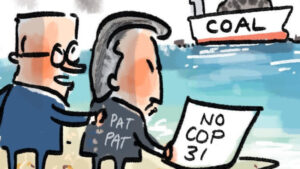
UPDATE: The controversial treaty process in Victoria is under intense scrutiny as critics argue it lacks historical legitimacy. The debate has reignited amidst claims that the treaty framework fails to represent the Indigenous groups originally inhabiting the land.
As this situation unfolds, experts are questioning the validity of modern treaties that are being pursued, claiming they do not reflect the realities of pre-colonial governance. The Gadigal people, a clan connected to the Eora Nation, are at the center of this heated discourse, which has implications for all Indigenous groups across Australia.
Critics assert that the concept of a treaty today is a misrepresentation of historical facts. They argue that the structures required for treaty-making did not exist in 1788, when the British first settled at what is now Sydney Cove. The assertion is that there were no sovereign Indigenous nations capable of entering into treaties, and thus, any modern treaty lacks foundational legitimacy.
As the Yoorrook Justice Commission continues its work, the push for recognition and reparations intensifies. However, the commission’s findings are being challenged by historians who highlight that the social structures of Indigenous groups were vastly different from the centralized governance recognized today.
The political climate surrounding these treaty discussions is charged, with implications reaching beyond Victoria. Various state governments are watching closely, as similar treaty processes are being considered in New South Wales and Queensland. The potential fallout from these debates could reshape how Australia approaches Indigenous rights and sovereignty.
Officials and historians point out that the terms used in current discussions, such as “First Nations” and “sovereign peoples,” may be misleading. They argue that modern interpretations of these terms do not align with the historical realities faced by Indigenous communities at the time of settlement.
The impact of these discussions is profound, as they touch on issues of identity, governance, and historical accountability. As the debate continues, many Indigenous leaders express concerns over the implications of these treaties, emphasizing the need for authentic representation and understanding of their cultural heritage.
What happens next remains uncertain, but the urgency of this conversation is palpable. With the backdrop of a politically charged environment, all eyes are on Victoria and its treaty process as it unfolds. The implications of these discussions could redefine the relationship between Indigenous communities and the Australian government for generations to come.
Stay tuned for more developments as this story progresses.






